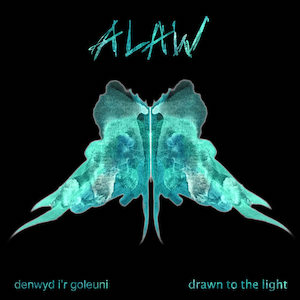
Alaw – denwyd i’r goleuni (Drawn To The Light)
Taith Records (Trcd00025) – Out Now
Alaw was the collective name given to three Welsh musicians (guitarist Dylan Fowler and two members of Mabon – violinist Oliver Wilson-Dickson and accordionist Jamie Smith) who got together back in 2013. Those with a knowledge of the Welsh language will be familiar with the concept of “alaw”, which quite literally means “melody”; thus, the trio’s debut CD bore that one-word title in celebration of the unique species of melody that characterises Welsh traditional music. Their special brand of music-making was characterised by an instinctive response to the rhythmic and harmonic possibilities contained within each tune and a pleasingly laid-back sense of propulsion. The trio’s 2017 follow-up album, Dead Man’s Dance (Dawns y Gŵr Marw), not only marked a significant step forward in expertise on an even wider range of material from Welsh poetic and musical traditions, but also (on just over half of the tracks) featured vocals, these supplied according to the demands of each song by Oliver, occasionally Jamie, and guest singers (Gwilym Bowen Rhys or Georgia Ruth), providing the captivating melodies with a further invigorating and exciting dimension of expression.
After two wildly successful years of consolidation, including an acclaimed, show-stopping appearance at the 2018 BBC Proms, 2020 brought further change for Alaw. Having said goodbye to Jamie during the first difficult phase of lockdown, Dylan and Oli have since taken their music on to another level by recruiting the multi-talented singer and instrumentalist Nia Lynn – and on the evidence presented by album number three, Drawn To The Light (Denwyd I’r Goleuni), they’ve clearly made an absolutely ideal choice. Not only is Nia’s singing authentic and quite simply exquisite, but her instrumental skill proves to be in perfect concord and continuity with Alaw’s legacy, their customary timbral blend and musical ambit, not least in that she has already, and astoundingly quickly, learnt the trio’s past repertoire. She also plays the accordion lines on her harmonium, somehow lending an even more rustic quality to the overall band sound. Nia has also written the words to the lovely Fill The House, one of the tracks that had appeared on the double-A-sided single released last December as a taster for the album; with its intriguingly angular, tripping melody line, it’s a memorable and affecting little benediction that deserves greater currency. The other track on that single was album opener Hiraeth, a gently animated account of a traditional piece whose narrator is trying to understand this uniquely Welsh concept (the closest we can come is a kind of intense and cruel longing that wakes one from one’s sleep at night).
Nia is also responsible for editing and adapting the epic Ballad of Rhuddlan Marsh (from the writings of early-19th-century clergyman Evan Evans, whose bardic name was Ieuan Glan Geirionydd), the latter a dramatic highlight of the album with its captivating progression of moods and inventive use of sparing instrumental texturings and gestures. Nia’s special personal combination of talents also comes to the fore on the following track, Bwthyn Fy Nain (My Nanna’s Cottage), which starts off in poised, anticipatory a cappella mode then builds sectionally to a breakneck pace to conjoin and interweave with Oli’s original tune Polca Nia (Nia’s Polka). Nia also contributes an extra instrumental colour in the form of wordless vocalise on a small handful of selections, notably Leo’s Slängpolska (written by Finnish friend Tuulikki Bartosik) and the spirited pairing of Digan y Pibydd Coch and Tŷ fy Llystad (track 10), while her soft, caressing, affectionate rendition of the valedictory Dai’r Cantwr (Dai The Singer) brings a stylish and apt finish to the whole album.
Dylan and Oli’s intense proficiency, their unstintingly high level of musicianship, can be taken as given of course, while the proven musical rapport between the two musicians has, of course, become well established during their long experience of working together over many years. Dylan’s filigree guitar work always communicates so very effectively, whether in solo rhapsody or in exciting counterpoint to Oli’s dazzling, dancing violin, and Drawn To The Light shows them at the top of their game – although, importantly, they also enjoy a comfortable flexibility of working that, while undeniably close-knit, nevertheless refuses to exclude ideas and interjections from a third group member (Nia), and the dovetailing of contributions is miraculous and brilliantly managed. The album’s six purely instrumental selections exhibit all the generous, sparkling energy that you associate with Alaw: the wonderfully joyous track three pairing is an excellent example of this, while Y Dôn Goll (The Lost Tune) and Triban Fonmon aren’t far behind. And the even briefer medley of Having Doubts and The Memory Of Llanedi (track 9) brings a première of what the laconic sleeve note calls a “niche market” viola and drum (tabwrdd) trio!
Presentation-wise, the enclosed booklet aptly mirrors contents with translations for the benefit of non-Welsh-speakers. Although there’s little in the way of background information on the tunes’ origins, this proves no real disadvantage.
Drawn To The Light is indeed a suitably emblematic title for Alaw’s latest album, for it signals the musicians’ triumphant re-emergence from lockdown. And its strong, vital sense of togetherness is but one of the myriad of qualities that make it such an exceptional album – one to which you’ll be drawn like the moth on the cover as you join in the dance (the Gorymdaith y Gwyfod)!
Order the album and find details of live dates here: http://www.alaw-band.com/
